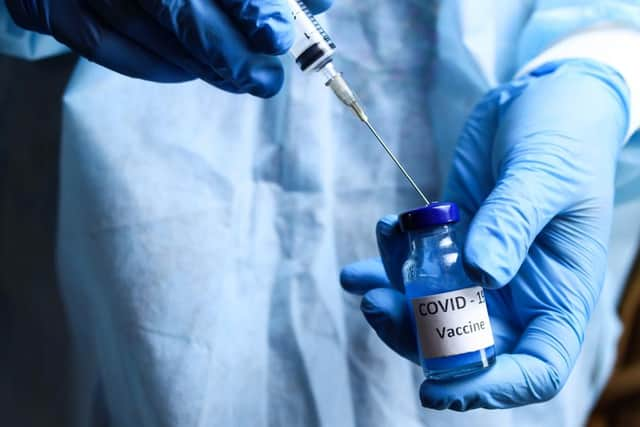Can you get Covid when vaccinated? Guidance on whether you can still catch and spread Covid after the vaccine
and live on Freeview channel 276
More than 44 million people in the UK have now received their first dose of the Covid vaccine, with more than 33 million people having received both doses of the vaccine.
But can you still catch and spread Covid after you’ve been vaccinated?
Here’s what you need to know.
Advertisement
Hide AdAdvertisement
Hide Ad

Can you still get Covid after you’ve been vaccinated?
All of the Covid vaccines currently in use across the UK have been shown to reduce the chance of you suffering from Covid-19 with each vaccine having been tested in more than 20,000 people.
However, after receiving either one or both doses of the Pfizer, AstraZeneca or Moderna vaccine, it may take a few weeks for your body to build up some protection from the vaccine.
Public Health England (PHE) says that, like all medicines, “no vaccine is completely effective, so you should continue to take recommended precautions to avoid infection.
“Some people may still get Covid despite having a vaccination, but this should be less severe.”
Advertisement
Hide AdAdvertisement
Hide AdAccording to clinical data, the Pfizer vaccine is 95 per cent effective in preventing Covid two weeks after the second dose of the jab.
Moderna's vaccine has been found to be 94 per cent effective in preventing Covid two weeks after the second dose.
A recent study conducted by PHE also found that the Pfizer vaccine was 88 per cent effective at stopping symptomatic disease from the Delta variant two weeks after the second dose, compared with 93 per cent effectiveness against the Alpha variant.
The AstraZeneca jab was found to be 60 per cent effective against the Delta variant, compared with 66 per cent efficacy against the Alpha variant.
Advertisement
Hide AdAdvertisement
Hide AdHowever, both vaccines were only 33 per cent effective against the Delta variant three weeks after the first dose, compared with 50 per cent effectiveness against the Alpha variant.
The single-dose Johnson & Johnson vaccine - developed by the company's pharmaceutical arm Janssen - has recently been approved for use in the UK by the Medicines and Healthcare products Regulatory Agency (MHRA.
The vaccine has been shown to be 67 per cent effective overall at preventing moderate to severe COVID-19.
Can you spread Covid after receiving the vaccine?
The vaccine cannot give you Covid and a full course will reduce your chance of becoming seriously ill.
Advertisement
Hide AdAdvertisement
Hide AdHowever, PHE adds: “We don’t know how much it will reduce the risk of you passing on the virus. So it is important to continue to follow current national guidance.”
To protect yourself and your family, friends and colleagues, you should still:
- practise social distancing
- wear a face mask
- wash your hands carefully and frequently
- open windows to let fresh air in
- follow the current guidance
What are the side effects of the Covid vaccine?
Most side effects of the Covid-19 vaccine are mild and should not last longer than a week, according to the NHS.
You can report any suspected side effect using the Coronavirus (COVID-19) Yellow Card safety scheme.
Advertisement
Hide AdAdvertisement
Hide AdThe Coronavirus Yellow Card website also says: “Vaccines are the most effective way to prevent infectious diseases and they save millions of lives worldwide.
“Like all medicines, vaccines can cause side effects. Most of these are mild and short-term, and not everyone gets them.”
Side effects can include:
- a sore arm where the needle went in
- feeling tired
- a headache
- feeling achy
- feeling or being sick
You may also get a high temperature or feel hot or shivery one or two days after having your vaccination.